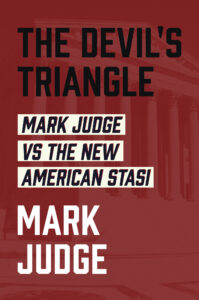We Gave Away Our Freedom

It was 1990. Communism was collapsing. The Berlin Wall had fallen. The West seemed to be facing a bright new future. After seventy years the world was going to embrace freedom
It wasn’t to be. Communism stayed alive in the universities, then colonized the wider culture. If somebody in America in 1990 told you that in 2024 we would have censorship, speech codes, sensitivity readers for novels and Christian bakers charged with crimes for following their conscience, you would not have believed him.
Please Support The Stream: Equipping Christians to Think Clearly About the Political, Economic, and Moral Issues of Our Day.
What is most tragic about the new totalitarianism is that it is being so widely embraced. If the communist Chinese were to invade tomorrow, I know people who would be lining the streets to greet our new slave masters. I’m sure you do as well. (Take a minute to list their names.)
Shockingly, many of those who want tyranny are the young. College students are being turned out ignorant and illiterate by their teachers.
A Sin Against Ourselves and Our Kids
We are committing a sin against ourselves. We are allowing the left to separate us from our senses and from reality. It’s on us. We have the ability to be free and simply refuse to do so. The idea of the loss of freedom as a sin against ourselves comes from a speech Vaclav Havel gave on January 1, 1990. Havel was the playwright and rock-and-roll loving dissident who became the president of Czechoslovakia when communism was toppled.
In his New Year’s Day speech, Havel put the blame for the disastrous previous decades under socialism at the feet of the people. Here’s how he explained it:
It would be very unreasonable to understand the sad legacy of the last forty years as something alien, which some distant relative bequeathed to us. On the contrary, we have to accept this legacy as a sin we committed against ourselves. If we accept it as such, we will understand that it is up to us all, and up to us alone to do something about it. We cannot blame the previous rulers for everything, not only because it would be untrue, but also because it would blunt the duty that each of us faces today: namely, the obligation to act independently, freely, reasonably and quickly.
Havel went on to say that “the worst thing is that we live in a contaminated moral environment. We fell morally ill because we became used to saying something different from what we thought.” People under communism
learned not to believe in anything, to ignore one another, to care only about ourselves. Concepts such as love, friendship, compassion, humility or forgiveness lost their depth and dimension, and for many of us they represented only psychological peculiarities, or they resembled gone-astray greetings from ancient times, a little ridiculous in the era of computers and spaceships.
Tradition: The Democracy of the Dead
As a final and crucially important point, Havel explained that the young people of Czechoslovakia embraced freedom so enthusiastically after socialism because they believed in God and in democracy:
People are never just a product of the external world; they are also able to relate themselves to something superior, however systematically the external world tries to kill that ability in them. … [T]he humanistic and democratic traditions, about which there had been so much idle talk, did after all slumber in the unconsciousness of our nations and ethnic minorities, and were inconspicuously passed from one generation to another, so that each of us could discover them at the right time and transform them into deeds.
What is so tragic and dispiriting about our world more than three decades later is that we are once again sinning against ourselves. Our young people no longer have even a subconscious memory of “the humanistic and democratic traditions.” If anything, our universities try to purge the memory of America and her founding by painting the Founding Fathers as racist colonialists. It’s incredible that after the Berlin Wall came down and a digital revolution made it possible to read any book, see any movie or listen to any musical artist, young people still refuse to embrace freedom.
How We Got Here
In 1990 Vaclav Havel was looking towards a bright post-Socialist future. Then came Barack Obama, whose mentor Frank Marshall Davis was a communist party member. Then came speech codes and censorship. Then came Christian shopkeepers getting sued by the government. Then came COVID lockdowns to which we sheepishly complied. Now we have puppet Joe Biden and people in Congress who proudly call themselves socialists. The media is more corrupt than even in the old Soviet Union. It’s a sin, and it’s on us. We refuse to live freely.
Bret Easton Ellis, a popular novelist of my generation (X) once noted in an interview that those of us who were teens in the 1980s “loved to be offended.” It’s true. We were born in the 1960s, were kids in the 70s, and teens in the 80s. We liked racy and gritty novels that were not politically correct, loud punk rock music, and challenging movies.
Yet we also loved J.R.R, Tolkien, Beethoven, C.S. Lewis, jazz and Flannery O’Connor. We loved patriotic movies like Top Gun. We had been kids in 1976 during the Bicentennial celebrations of the founding of America, and like the kids under communism, we had in our hearts a desire for God and in our subconscious awareness of the value of freedom. We knew Marxism was a lie.
Like Vaclav Havel, in 1990 we were looking forward to a bright future. It never arrived.
Mark Judge is a writer and filmmaker in Washington, D.C. His new book is The Devil’s Triangle: Mark Judge vs the New American Stasi.







